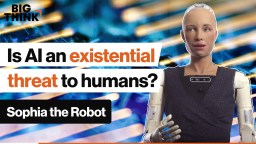BEN GOERTZEL: SingularityNET is a blockchain-based platform for artificial intelligence and it originated really when I realized that two goals that I had could be fulfilled simultaneously by the same software platform. One goal being providing a tremendous variety of AI services created by a huge variety of different developers across all areas in a way that's decentralized and democratically controlled rather than within the proprietary silos of big tech companies; and the other goal is to work toward powerful and beneficial artificial general intelligence. And what I realized at a certain point is you can achieve both of these goals by making a framework where multiple AIs written by multiple people can be put into a common platform where they can not only serve requests from end users but they can exchange data among each other and the different AIs in the network can ask questions of each other and help each other solve problems. So you have multiple AIs in the same network that, you know, they can compete with each other for providing services, but they also cooperate and link together into networks of cooperation. So the whole network of AIs becomes this sort of meta-AI, a society and economy of minds, which is in itself a kind of emergent-level mind. So there's a commercial aspect of low cost AI services across vertical markets providing incentive for any AI developer to contribute into the network, and there's sort of a broader singularity-aterian motive, which is 'Hey what's the best way to create the framework within which artificial general intelligence can crystallize and emerge?'
The role of blockchain in SingularityNET is really to enable secure decentralized control. So without blockchain, of course we could make a distributed network of AIs that all talk to each other and share data and outsource work to each other, but we need to have like some central control point that kept a record of who's in the network, who's allowed to enter into the network and what each guy in the network can offer to whom. And then if there was going to be a change to how it operated all the changes would propagate from the central control point. What blockchain lets you do is have a network of AIs all cooperating and operating by a common protocol but have no central controlling and governing agent. Rather the records of what happens in the network are stored distributive – we have copies of the records everywhere. And then control is governed by democratic decision making among all the participants so it's like a digital biological organism with no central point of control, and this has various advantages in terms of the inter-operation of this network of AIs with the human world and with countries and companies and people because it means there's no one person or company or government who owns the thing or controls the thing. And this puts the network in a quite different status relative to the world economy and human society than if there was a single human owner who is responsible for everything.






